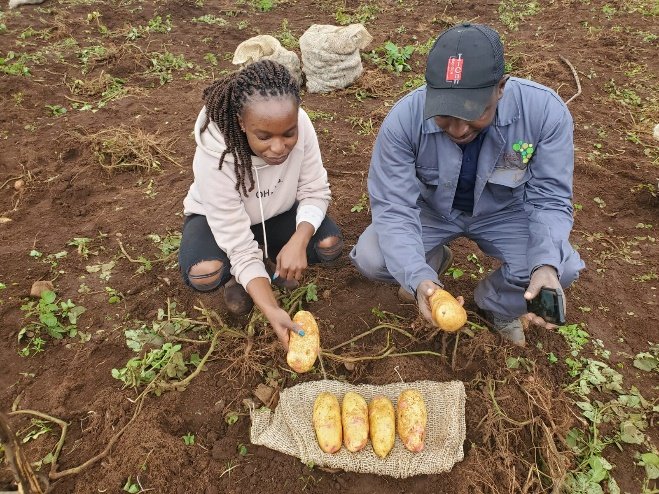By Busani Bafana
Two new potato varieties, which are resistant to potato cyst nematode (PCN), have been introduced to Kenya where tubers are a staple crop. The new varieties, Malaika and Glen, were developed by scientists at The James Hutton Institute. Malaika is named after the daughter of a farmer who was integral to the early field trials, and Glen reflects the Scottish heritage of the varieties.
Nematodes attack potato roots, stunting their growth and can wipe out potato yields by up to 100 percent. PCN has been reported in four countries in East and Southern Africa. It infects and feeds on potato roots, causing significant yield losses and threatening regional trade. However, research has shown that early detection and management are critical to protecting farmer livelihoods and regional potato markets.
The varieties are a product of advanced conventional breeding techniques that successfully combined the most desired traits of local Kenyan growers with a natural resistance to PCN. This precise breeding means farmers no longer have to choose between high-yielding, preferred potatoes and resistant ones—they now have both in a single package. The research involved international collaboration between the James Hutton Institute – a worldleading scientific organisation and the University of St Andrews, the International Institute of Tropical Agriculture (IITA), the International Potato Center (CIP), and Kenyan authorities including Kenya Plant Health Inspectorate Service (KEPHIS).
After passing rigorous National Potato Trials and winning approval from local processors, the varieties have been officially added to Kenya’s National Variety List. IITA is a not-for-profit institution that generates agricultural innovations to meet Africa’s most pressing hunger, malnutrition, poverty, and natural resource degradation challenges.
These new varieties provide a resilient, reliable foundation to secure this vital crop for the future. With PCN also present in neighboring countries, these varieties have the potential to transform agriculture across East Africa, offering a proven route to greater resilience and food security.
Potatoes are an essential staple food in Eastern and Southern Africa, supporting the livelihoods of an estimated 800,000 smallholder farmers and covering over 800,000 hectares of land. Nearly 9 million tons of potatoes are produced in the region annually. Potato is Kenya’s second most important food crop after maize and benefits some 2.5 million people across the value chain.
However, the future of the potato has been in peril with the silent and deadly spread of PCN. Extensive research ensured Malaika and Glen meet specific local needs: they have low dormancy for quicker replanting, cook faster to reduce fuel costs and produce high yields that meet market demands. “The release of these two varieties is the culmination of many years’ work and is a collaboration between
social scientists, crop scientists, plant breeders, the Kenyan Government, seed suppliers, and farmers,” Prof John Jones, the Hutton lead on the project, said in a statement.
“It has brought together researchers and stakeholders in the UK and Africa to help ensure that we provide solutions that align with the needs of growers in the region. I’m delighted that we have passed this critical milestone.” Dr Danny Coyne, Senior Scientist at IITA, remarked: “This has been a remarkable journey involving multiple partners working together to ensure the success of this initiative. Potato Cyst Nematode (PCN) is a major pest affecting a key crop in Kenya and the broader region.”
“The introduction of Malaika and Glen represents a significant breakthrough in controlling this pest, directly addressing the urgent needs of farmers. This advancement will help safeguard their livelihoods, improve crop yields, and contribute to food security, ” said Dr Coyne.
information collected during the project will be used to shape plans for distributing the new potato varieties, giving farmers the confidence to grow them. The introduction of new varieties will now be scaled up through partners like Kisima Seeds for the commercial sector, while Syngenta Foundation Farmers’ Hubs will provide advice and multiply healthy seeds for smallholders. Currently, around 90 percent of growers source seed from their farm or neighbours, with only 6 percent buying from certified seed suppliers.

